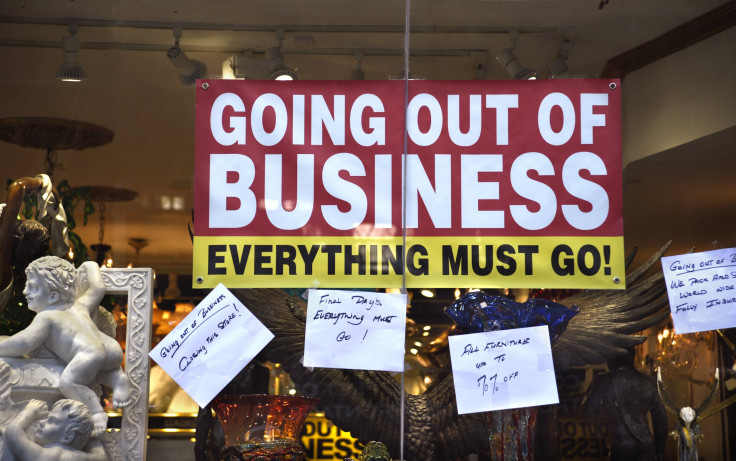Retail Bankruptcies 2021: 5 Retailers That Felt The Pandemic's Pinch And Filed Chapter 11
The COVID pandemic has not been kind to the retail industry as it continues to claim a swath of victims.
Burdened by debt and unmanageable rent payments, many retailers have had to rethink their brick-and-mortar strategy, while others are succumbing to Chapter 11.
Here are five major retailers that have filed for bankruptcy protection in 2021 due to pandemic-related issues.
Belk
In February, department store chain Belk announced that it was filing for bankruptcy protection in a one-day “pre-packaged” Chapter 11 reorganization.
Hit by the pandemic, Belk was burdened by nearly $2 billion debt and saw its sales drop by 32% from March to December 2020, Retail Dive reported.
The Charlotte, N.C.-based retailer emerged from bankruptcy in 24 hours, reducing about $450 million in debt and extending its loan terms to July 2025. Belk said at the time that no operations would be affected and customers would continue to “receive the quality merchandise and service they expect” when shopping at its stores and online.
Through the restructuring, private equity firm Sycamore Partners retained majority control of Belk, which has secured a financial commitment of new capital from the private equity firm, as well as other investors and lenders, of $225 million.
Belk’s nearly 300 stores remained open through the bankruptcy process. The company’s stores have been located in 16 Southeastern states for over 130 years.
Paper Source
Also affected by the pandemic is card and gift retailer Paper Source. The company filed for Chapter 11 bankruptcy in early March, with the company saying in a court filing that it would close at least 11 stores.
Paper Source, which has 158 stores, was also shopping for a buyer and has a stalking-horse bidder in MidCap Financial, which will provide $16.5 million in financing, Retail Dive reported.
Paper Source picked up Papyrus, another card and gift retailer, for $8 million in 2020. The move came after Papyrus filed for bankruptcy, adding 30 stores to Paper Source's portfolio.
Just weeks after the Papyrus acquisition, the COVID-19 pandemic hit, and nonessential stores were closed in March temporarily due to state lockdown orders. In court documents, Paper Source said it was expanding rapidly prior to the pandemic, but it “sustained deep damage” from the COVID crisis.
Paper Source’s sale hearing is set for April 30.
L’Occitane
Beauty retailer L’Occitane filed for bankruptcy protection in January, citing the impact of the coronavirus pandemic.
L’Occitane also said that disproportionately high store rent obligations were no longer “tenable” and the company determined at the time that its best option was to file for Chapter 11 despite its year-over-year growth in online sales. It also said that it had tried to address the “unmanageable store lease terms” with its landlords repeatedly to no avail.
Through the Chapter 11 restructuring, L’Occitane said that it had enough liquidity to support ongoing operations and fulfill all commitments to employees, customers, and suppliers.
"Over the past year, we have moved aggressively to address COVID-related challenges head on, developing innovative new ways to connect with our community and continue to deliver the extraordinary L'Occitane beauty experience that our customers know and love, all while accelerating the essential transformation of our store footprint already underway,” Yann Tanini, managing director of L’Occitane North America, said in a statement at the time.
L’Occitane had 166 stores at the time of its bankruptcy filing, and planned to immediately close 23 locations, Retail Dive reported.
Loves Furniture
Loves Furniture also filed for Chapter 11 bankruptcy protection amid the COVID-19 pandemic. The regional furniture retailer restructured in January, attributing its downfall to shipping issues and a dispute with a logistic vendor, court documents obtained by Retail Dive revealed.
Loves was created through the liquidation of furniture retailer Art Van, which filed for bankruptcy in 2020. Loves Furniture took over the vacant stores that Art Van left behind, selling furniture in the regional markets of Pennsylvania, Ohio, Maryland, Virginia, and Illinois.
According to Retail Dive, some of these stores closed in the fall, leading customers to believe that Loves had closed permanently. Low on cash and stuck with too much inventory, Loves Furniture struck an agreement to liquidate its excess inventory and move forward with only 12 stores, the news outlet said.
Christopher & Banks
Christopher & Banks fell to the COVID crisis and filed for Chapter 11 in mid-January after seeing its store traffic decline as consumers stayed home amid the pandemic.
The women’s apparel retailer said that it would close a significant portion, if not all of its stores. The company had 449 locations in 44 states at the time, including 315 MPW locations, 76 outlet stores, 31 namesake stores, and 21 CJ Banks locations.
Store sales made up about 75% of Christopher & Bank’s revenue, so when stores temporarily closed in March due to the pandemic, the toll was too much to take for the retailer, sending sales down 22.6%, Retail Dive reported.
Facing eviction and financially strained, the retailer was seeking a buyer for its e-commerce site and related assets and said it was in talks with potentially interested suiters.

© Copyright IBTimes 2024. All rights reserved.





















